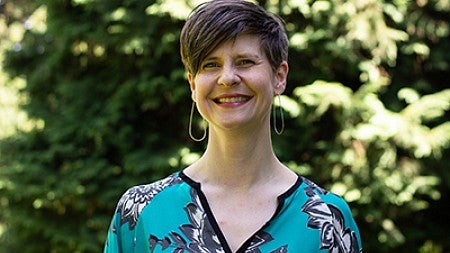
English
tinarb@uoregon.edu | 541-346-0056
Courses: WR 121, WR 320, WR 321
In my classes you will:
- Practice foundational, transferrable skills.
- Develop a significant project that will challenge you and make you proud.
I was invited into the Teaching Academy because:
- I participated in the UO Summer Teaching Institute.
In what ways are you working to make your teaching inclusive?
Because I teach required, introductory critical reasoning and writing courses, it is crucial to make my students feel welcome and engaged. Most students carry considerable anxiety about their ability to write, and many believe that writing well is something you either know how to do or don’t, rather than understand it as a skill that can be developed. Through my participation in 2018’s Summer Teaching Institute as well as programs offered through my unit, I have adopted better first-day-of-class strategies and grading systems to address student anxiety and reduce barriers to success. Taking small actions that you can revisit throughout the term is a simple way to remind students that you are there to support their learning. Relatedly, building in low- stakes ways for students to try new strategies and techniques in their writing is essential to sustaining their trajectory towards mastering a new skill.
What do you do in terms of professional engagement with the teaching and learning culture on campus or nationally?
I’m extraordinarily lucky to be part of a vibrant community of colleagues who take very seriously their role as writing instructors. In the Fall 2017, I attended a symposium on Anti-Racist Writing Assessment, led by Dr. Asao Inoue and facilitated by Dr. Emily Simnitt and Dr. Brian Gazaille. Our program also hosts the Inclusive Pedagogies Reading Group in which faculty from Composition and beyond meet twice a quarter to read and discuss scholarly work on the practice of teaching writing. In addition, spending a week in the First-Year Student pathway of 2018’s Summer Teaching Institute was transformative. Working with colleagues from various units across campus who teach a variety of courses allowed me to see how similar our concerns are when it comes to supporting our students.
In what ways was your teaching in this course research-led—informed by research on how students learn and inflected by UO's research mission?
Research on best practices for student learning is clear: students learn and retain the most by active learning. I had always believed that the majority of my class sessions were interactive, particularly because I’m lucky enough to teach small classes ranging from 18-23 students. However, after reviewing my lesson plans, I realized I could do more. This past quarter I worked to take my most lecture-heavy days and turn them into student-led sessions where my lectures lasted 10-12 minutes at most, and during the rest of class time, students worked in small groups on an activity that culminated in presenting and discussing their work to the class, whether it be through a brief report, writing something on the board, or posting something online.
Who or what led you to this discipline? What is the most inspiring or exciting thing about your field of study? How does your field of study enrich people’s lives?
Critical reading, reasoning, thinking, and writing are foundational skills. Argumentative writing is a core competency that every single person needs, regardless of major or future career. Because it’s so necessary, it’s easy for many to overlook its importance. I take great pride in working with students to become better thinkers. How do you find your creativity? My colleagues! They are a brilliant group of professional teaching faculty who continually work to improve their teaching and are eager to share ideas, problem solve, and brainstorm better ways of ensuring student success.
